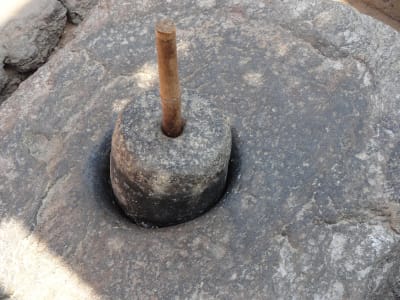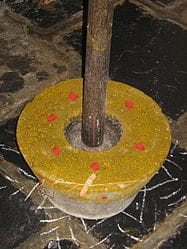Two moves, two schools, and three houses later

After leaving the farm by the train tracks, we were adrift for a while. The new place నాన్న (Nanna is father in Telugu) was transferred to was a very small village. We couldn’t find a house to rent for several months. నాన్న (Nanna) started working and sleeping at the hospital while he looked for a house to bring the family. అమ్మ (Amma is mother in Telugu), my little sister and I stayed with తాతయ్య (Tatayya is grandfather in Telugu). We were close to my father’s side of the family and my paternal grandfather’s house was our home during our transition periods during moves from one place to another. This wait meant I was out of school for a long period of time.
We finally made it to our new home, a large farmhouse. The house had a boundary wall enclosing a large front yard with a large shade tree in the front left corner of the yard. The house had a large veranda with a set of stairs from the front yard and two front doors. Upon entering through the front doors, there was a large rectangular space the same size as the veranda which was split into two equal size rooms. The front doors from the veranda led into these two rooms. There was a door connecting the two rooms and doors connecting them to the kitchen behind them. We didn’t have access to one of these rooms. Our landlord used it as storage. Several steps from the kitchen directly led to the backyard down below. The backyard had a బావి (baavi is a small well with a pulley in Telugu) in one corner that supplied water for the house. You can draw water from the well using a bucket with rope tied to it. If a well didn’t have a pulley, then you could drop the bucket with a rope tied to it and fill it with water and then pull it back up. We drew water from this well for our household chores, bathing, and drinking. Who needs to go to the gym to get on the rowing machine after this workout?
Our landlord and his family lived in the backyard in a small thatch roofed cottage. The backyard was a common space for all of us to do our household chores. There was a large రుబ్బురోలు (rubbu rolu) there in one corner which we shared with our landlord’s family. రుబ్బురోలు (rubbu rolu) is a large grinding stone with a round hole in the middle. Another rounded stone with a wooden handle fits right into the hole in the large grinding stone. Stuff to grind goes into the hole and a rotating motion with the rounded stone holding its wooden handle gets the job of grinding done.

When grinding dry things such as peppers, rice, or turmeric root, a రోకలి (rokali), a long wooden stick with a metal plate at the bottom is used to pound grain placed in the hole in the రుబ్బురోలు (rubbu rolu). రోకలి (rokali) is called a rice-pounder in English.

The landlord’s wife used to make delicious బండ పచ్చ్చడి (banda pachadi) for dinner with green tomatoes or వంకాయ (vankaya is brinjal or eggplant in Telugu) and పచ్చిమిర్చి (pachi mirchi is green Indian hot peppers in Telugu). బండ పచ్చ్చడి (banda pachadi) is a chutney made out of fresh vegetables. The fresh vegetables are coarse ground using using a బండ (banda is stone). She would serve బండ పచ్చ్చడి (banda pachadi) with steaming hot rice. She was a nice lady, but she was a bit obsessed with me being close to puberty. Her comments made me self conscious. I started hiding from her as much as possible.
I turned ten a few months before we moved to this small village. I was enrolled in a school in a neighboring larger village. I walked along a highway to get to school and back. The highway was busy with APSRTC buses, lorries (trucks), bullock carts, and foot traffic, a very typical Indian highway. The school was nice and large for a small village. I learned to weave on a large weaving machine during my arts and crafts class. We made నవ్వారు (navvaru), a broad cotton tape used for weaving the support for a mattress in a bed. I enjoyed weaving and would have liked to get better at it. Unfortunately as I was still trying to get used to the new school and make friends, we had to move just after less than two months. The upside was that the house we were living in didn’t have a bathroom or toilet. We turned one corner of our large kitchen into a bathing area which was an easier problem to solve. As for the toilet, we had to do our business out in open fields. This experience was rather difficult for all of us and was especially hard on అమ్మ (Amma). We were more than happy to leave the house and the village behind.
We packed all of our belongings in seven or eight large metal trunks, several suitcases, holdalls, and bags. It was my responsibility to pack books whenever we moved. I packed all of our books carefully in a large trunk with other things. We had a large cement color metal Godrej beeruva (cabinet) that went with us when we moved. A green wooden dining table, and a green meat safe with two doors with wire mesh inserts were the other two items that went with us. అమ్మ (Amma) would keep boiled milk, fresh butter, buttermilk, ghee, curd, and other food items in the meat safe. This way food was safe from animals and critters. Meat safes were commonly used to keep food before refrigerators became a household item. She would boil milk in the morning and the leftover milk after coffee would be saved in the meat safe for afternoon tea.
రుబ్బురోలు (rubbu rolu) and an oval shaped stone mortar and pestle we called కలం రాయి (kalam rayi) were the heavier items items we took with us. They were much needed items to grind spices, and grains for dosa and idli batters. అమ్మ (Amma) cherished these two items as she git them as gifts when she got married. Packing up the household took a few weeks. The kitchen fires had to be kept burning during the packing to cook meals. The kitchen was the last one to be packed up. అమ్మ (Amma) packed rice, spices, grains, and flours carefully in a large trunk. She had a green trunk she brought with her when she got married which she cherished. She packed her things in that trunk. It reminded her of her parent’s place and childhood. This trunk was painted by her younger brother to get it ready for her to take with her after her wedding. Another important reason why this trunk was precious to her. We loaded all of our luggage onto a lorry and one of our attendants would travel in the lorry to safeguard our belongings. We traveled by bus or train to our new house.
అమ్మ (Amma) packed కుంపటి (kumpati), a cup of rice, ground cardamom, and sugar in her hand luggage to be able to make pongali when we entered our new home. Our first day at every new home began with Amma making పొంగలి (pongali) on her కుంపటి (kumpati). పొంగలి (pongali) is Telugu word for rice cooked in milk and sugar. కుంపటి (kumpati) is a small iron coal grill. The milk boiled over whenever she made పొంగలి (pongali. Cooking ponagli and the milk boiling over the floor of the house is an important housewarming ritual to ward off evil to ensure the house is ready for the family to live in.
This second move in less than three months took us across the state of Andhra Pradesh from the Andhra region to the Rayalaseema region of the state of Andhra Pradesh. We didn’t take all of our belongings to Guntakal as it was far. We left our dining table, meat safe, Godrej beeruva, and a few other large items at our grandparents’ place in Bapatla. Our belongings went from our house to Guntur train station in a lorry (truck) to be loaded into a cargo compartment on the train we rode from Guntur to Guntakal, our destination. By this time, నాన్న (Nanna) owned a scooter which was also loaded onto the train. నాన్న (Nanna) got down to go to the cargo compartment at every station to keep an eye on our belongings and get back on the train as it was leaving the platform.
We had a small room with four berths on the train all to ourselves on this long trip. అమ్మ (Amma) packed a stack of పూరీలు (puris), a container full of mutton fry, and another container full of పులిహార (pulihara is Tamarind rice in Telugu) for the trip. Puri or poori is a deep fried bread made out of unleavened whole wheat flour. They are served for breakfast or light meals in India with potato curry. In our home, puris are served with delicious curry made out of potatoes, ఉల్లిపాయలు (ullipayalu are onions in Telugu), పచ్చిమిర్చి (pachi mirchi), and శనగపిండి (sanagapindi is besan flour in Telugu) curry. అమ్మ (Amma) makes పులిహార (pulihara) with Tamarind and also makes నిమ్మకాయ (nimmakaya) పులిహార (pulihara). The latter is my favorite. నిమ్మకాయ (nimmakaya) is Lemon or Lime in Telugu.
The landscape changed from lush green fields to rocky when we entered the Rayalaseema region. As the train labored through a barren and rocky region, I could see boulder strewn landscape all around me. It was totally unfamiliar and foreign to me. I stared out the window as long as I could until it was too dark. We reached Guntakal in the morning at the end of January after an overnight journey. As soon as we reached Guntakal, నాన్న (Nanna) rushed me to a small photography shop to get a picture taken for my 7th grade private examination application. We managed to submit the application on the last day. I missed several months of school and didn't have the required number of days of attendance to get admission into any school. Fortunately the state of Andhra Pradesh started allowing students who weren’t enrolled in a school to take the statewide 7th grade examination as private candidates that very year. It was rather fortunate for me without which I would have been forced to repeat 7th grade.
I completed 6th grade poorly and started 7th grade way behind in Math and not knowing Hindi alphabets. On top of that, I missed so much school that I just wasn’t ready to attempt final exams which were scheduled in three months. I worked with a teacher for three months getting ready for the 7th grade state exams. My teacher and his three daughters got me ready in a short span of time. I had to immerse myself in English, Telugu, Hindi, Mathematics, Biology, Physics, Chemistry, and Social Studies. It was a marathon learning session everyday starting early in the morning to the evening for three long months.
I walked to my teacher’s house located on a small side road, a couple of blocks from our house. It was a tile roofed house with a large veranda in the front and a large front yard and a boundary wall enclosing the property. The veranda was our classroom where we sat on bamboo mats. Our teacher’s wife was busy with household chores, cooking, and cleaning. She had a pleasant disposition and encouraged us to do our best. I owe my teacher and his daughters a debt of gratitude for getting me ready for the impossible task of cramming the entire year of studying into a short period of time.
The evening before the first exam, నాన్న (Nanna) told me to just give it my best. He said if I didn’t get through it would not be the end of the world. This conversation took place as we both sat on the terrace as the evening shadows were creeping in right before sunset. It gave me the much needed strength and encouragement to give it my best. నాన్న (Nanna) saying it would be okay if I didn’t succeed freed me from the stress and fear of failure. I remember walking to a large high school with a friend from my teacher’s place. It was a very long walk to the exam and back in the middle of summer. I remember sitting at the desk completing each of my exams. It was a huge relief to complete my last exam and walk back home. I did my best and waited anxiously for the results to be announced.
The outcome was surprisingly good contrary to all my concerns. అమ్మ (Amma), నాన్న (Nanna), my teacher and his three daughters, and my extended family were all pleasantly surprised and made me feel like I pulled off a miracle. Two moves, two schools, and three houses later and after my challenging 7th grade, I was ready to start 8th grade. This experience gave me the much needed confidence. I went from feeling like a kite in the wind with no direction to being anchored. This memory and experience continues to serve as a reminder that I could overcome obstacles seeking the right kind of help, giving my best without worrying about the outcomes.
